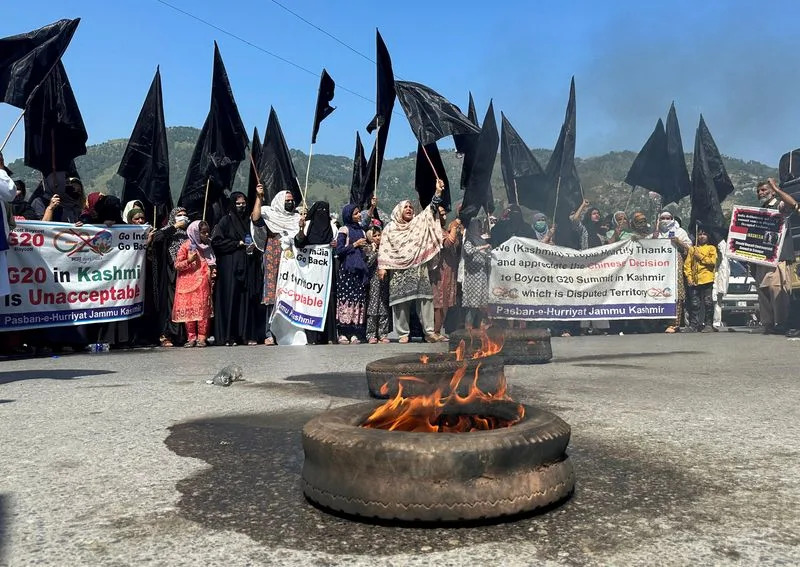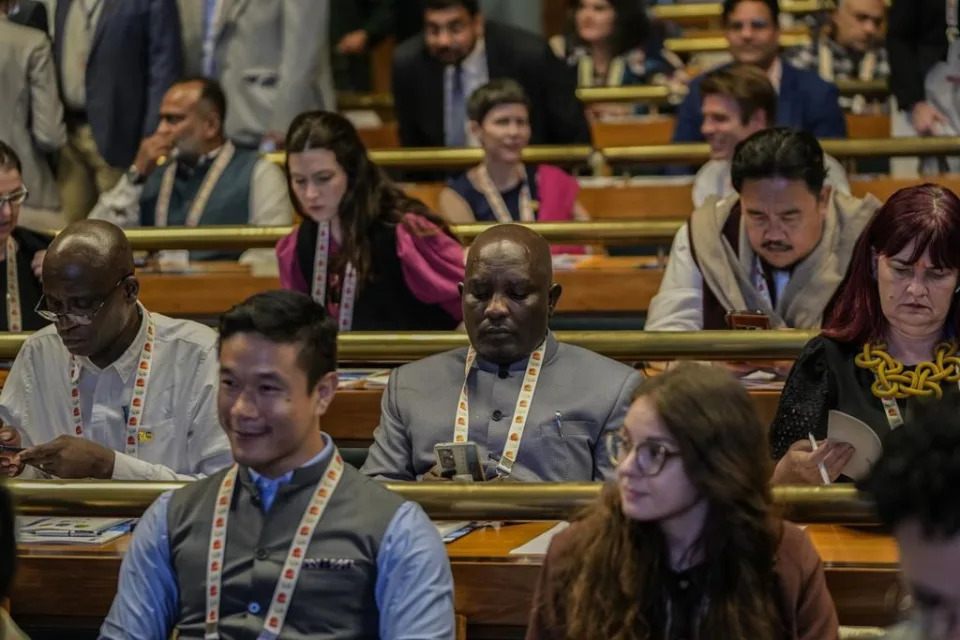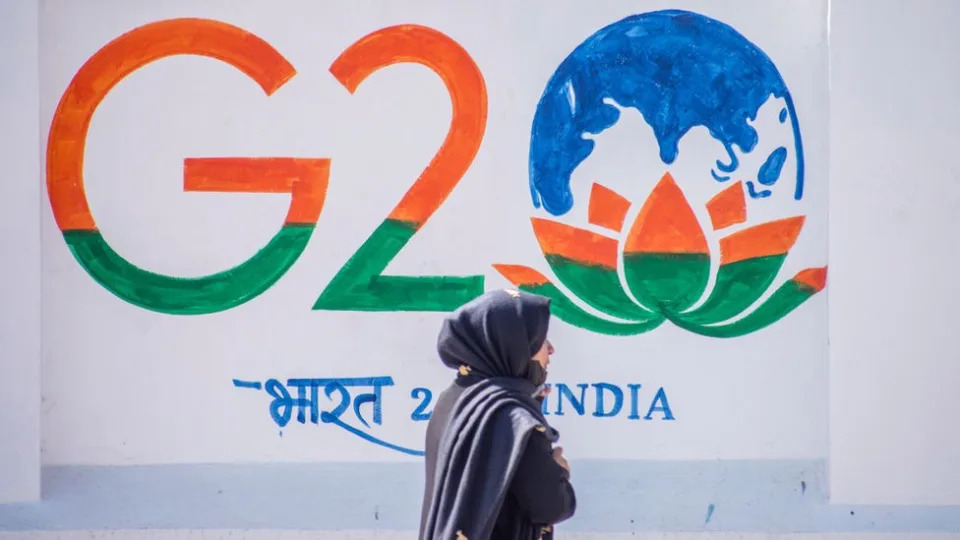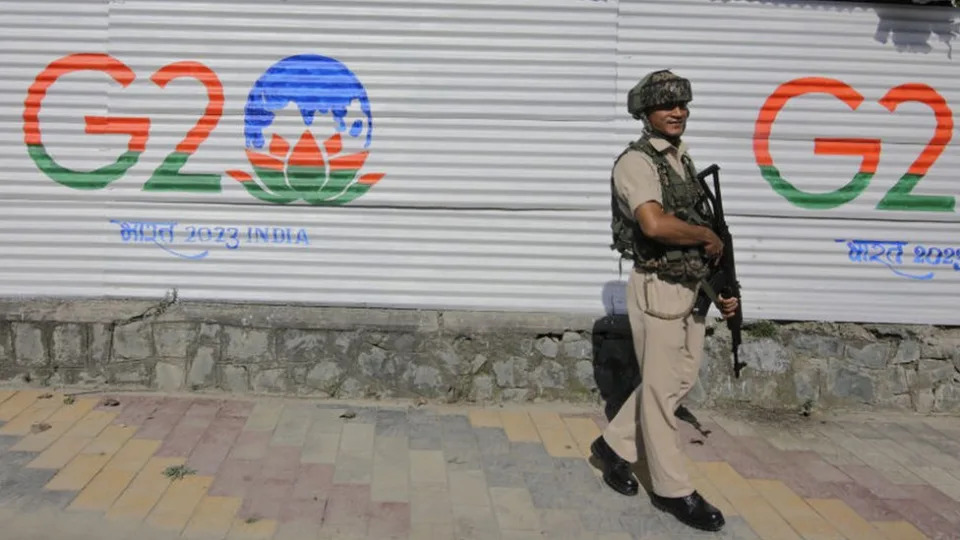#KASHMIR IS #INDIA'S #GAZA
Hundreds rally in Pakistan-ruled Kashmir against India G20 meet
SILENCE IS COMPLICITY
Abu Arqam Naqash
Mon, May 22, 2023

Protest against the G20 Tourism Working Group meeting, in Muzaffarabad
By Abu Arqam Naqash
MUZAFFARABAD, Pakistan (Reuters) - Hundreds of people rallied in Pakistan-administered Kashmir on Monday to protest arch rival India's decision to host a G20 tourism meeting in its part of the disputed Himalayan region, said a government official.
New Delhi is hosting the key conference in Kashmir's summer capital Srinagar from Monday to Wednesday, a move which Pakistan and longtime ally China have opposed.
Several protesters demonstrated in Muzaffarabad, capital of Pakistan-administered Kashmir, and other cities, chanting: "Go India go back and boycott, boycott G20 boycott!" , said the official Raja Azhar Iqbal.
Pakistan's Foreign Minister Bilawal Bhutto-Zardari visited the region and addressed Kashmir's legislative assembly on Monday. He termed the G20 gathering as illegal, and an attempt by India to seek legitimacy over its control of the disputed region.
"India is misusing its position as G20 chair," he said, and urged the world to take note of New Delhi's "gross human rights violations" since India scrapped Kashmir's special status in August 2019 and converted it into a federal territory.
The G20 tourism working group meeting is the first international event in the region since the conversion.
Indian foreign ministry didn't respond to a request for a comment.
Nuclear-armed nations, Pakistan and India have fought three wars since independence from Britain in 1947, two of them over Kashmir, which they each claim in full but control parts of.
G20 consists of 19 rich nations and the European Union. India at present holds it presidency, and is set to host its annual summit in New Delhi in September.
India hopes the meeting will help revive international tourism in the scenic Kashmir Valley which has been roiled by a violent Islamist insurgency against Indian rule since 1989, although violence levels have fallen in recent years and domestic tourism boomed.
(This story has been corrected to fix description of Kashmir's status from 'independent' to 'special' and India's action from 'annexed' to 'converted it into a federal territory' in paragraph 5, and 'annexation' to 'conversion' in paragraph 6)
(Writing by Asif Shahzad; Editing by Bernadette Baum)
Abu Arqam Naqash
Mon, May 22, 2023

Protest against the G20 Tourism Working Group meeting, in Muzaffarabad
By Abu Arqam Naqash
MUZAFFARABAD, Pakistan (Reuters) - Hundreds of people rallied in Pakistan-administered Kashmir on Monday to protest arch rival India's decision to host a G20 tourism meeting in its part of the disputed Himalayan region, said a government official.
New Delhi is hosting the key conference in Kashmir's summer capital Srinagar from Monday to Wednesday, a move which Pakistan and longtime ally China have opposed.
Several protesters demonstrated in Muzaffarabad, capital of Pakistan-administered Kashmir, and other cities, chanting: "Go India go back and boycott, boycott G20 boycott!" , said the official Raja Azhar Iqbal.
Pakistan's Foreign Minister Bilawal Bhutto-Zardari visited the region and addressed Kashmir's legislative assembly on Monday. He termed the G20 gathering as illegal, and an attempt by India to seek legitimacy over its control of the disputed region.
"India is misusing its position as G20 chair," he said, and urged the world to take note of New Delhi's "gross human rights violations" since India scrapped Kashmir's special status in August 2019 and converted it into a federal territory.
The G20 tourism working group meeting is the first international event in the region since the conversion.
Indian foreign ministry didn't respond to a request for a comment.
Nuclear-armed nations, Pakistan and India have fought three wars since independence from Britain in 1947, two of them over Kashmir, which they each claim in full but control parts of.
G20 consists of 19 rich nations and the European Union. India at present holds it presidency, and is set to host its annual summit in New Delhi in September.
India hopes the meeting will help revive international tourism in the scenic Kashmir Valley which has been roiled by a violent Islamist insurgency against Indian rule since 1989, although violence levels have fallen in recent years and domestic tourism boomed.
(This story has been corrected to fix description of Kashmir's status from 'independent' to 'special' and India's action from 'annexed' to 'converted it into a federal territory' in paragraph 5, and 'annexation' to 'conversion' in paragraph 6)
(Writing by Asif Shahzad; Editing by Bernadette Baum)
G20 delegates begin meeting in disputed Kashmir, with region's intense security largely out of view

Mon, May 22, 2023

Mon, May 22, 2023
SRINAGAR, India (AP) — Delegates from the Group of 20 leading rich and developing nations began a meeting on tourism in Indian-controlled Kashmir on Monday that was condemned by China and Pakistan, as authorities reduced the visibility of security in the disputed region’s main city.
The meeting is the first significant international event in Kashmir since New Delhi stripped the Muslim-majority region of its semi-autonomy in 2019. Indian authorities hope the meeting will show that the contentious changes have brought peace and prosperity to the region.
The delegates will discuss topics such as ecotourism, destination management and the role of films in promoting tourist destinations.
The main city of Srinagar appeared calm on Monday and roads were unusually clean. Most of the usual security checkpoints had been removed or camouflaged with G20 signs. Officials said hundreds of officers were specially trained in what they called “invisible policing” for the event.
Shops in the city center opened earlier than usual after officials asked shopkeepers to remain open. Many shops in the past have closed in protests against Indian policies in the region. But authorities shut many schools in the city.
Mondays’ measures contrasted sharply with the visible security imposed in the days before the event. A massive security cordon was placed around the venue on the shore of Dal Lake, with elite naval commandos patrolling the water in rubber boats. The city’s commercial center was spruced up, with freshly black-topped roads leading to the convention center and power poles lit in the colors of India’s national flag.
Indian-controlled Kashmir remains one of the world’s most heavily militarized territories, with hundreds of thousands of troops. In 1989, a violent separatist insurgency erupted in the region seeking independence or a merger with Pakistan, which also controls part of Kashmir. India replied with a brutal counterinsurgency campaign, and tens of thousands of civilians, soldiers and rebels have been killed in the conflict.
India’s crackdown intensified after 2019 when New Delhi took the region under its direct control. Since then, the territory’s people and its media have been largely silenced. Authorities have seized scores of homes and arrested hundreds of people under stringent anti-terror laws. The government says such actions are necessary to stop a “terror ecosystem,” or civilian support for the armed rebellion.
Authorities have also enacted new laws that critics and many Kashmiris fear could transform the region’s demographics.
Indian federal Minister Jitendra Singh told attendees on Monday that Kashmir is changing.
″If such an event was held earlier, a strike call would be given from Islamabad and shops on Residency Road (in) Srinagar would close. Now there is no hartal (strike)," he said. “Common people on the streets of Srinagar want to move on.”
Last week, the U.N. special rapporteur on minority issues, Fernand de Varennes, said the meeting would support a “facade of normalcy” while “massive human rights violations” continue in the region. India’s mission at the U.N. in Geneva rejected the statement as “baseless” and “unwarranted allegations.”
India’s tourism secretary, Arvind Singh, said on Saturday that the meeting was “not only to showcase (Kashmir’s) potential for tourism but to also signal globally the restoration of stability and normalcy in the region.”
Kashmir, known for rolling Himalayan foothills, has for decades been a major domestic tourist destination. Millions of visitors arrive in Kashmir every year and experience a strange peace kept by ubiquitous security checkpoints, armored vehicles and patrolling soldiers.
The mainstay of Kashmir’s economy, however, continues to be agriculture, and the tourism industry contributes only about 7% to the region’s GDP.
China, with which India is locked in a military standoff along their disputed border in the Ladakh region, has boycotted the event. Pakistan also slammed New Delhi for holding the meeting in Srinagar. Both have argued that such meetings can't be held in disputed territories.
In a speech to lawmakers in Pakistani-controlled Kashmir on Monday, Pakistani Foreign Minister Bilawal Bhutto Zardari said the Srinagar meeting was a “display of India’s arrogance on the world stage" and the region "has become an open prison” for its residents.
India dismissed Pakistan's criticism, saying it is not even a member of the G20.
The G20 has a rolling presidency with a different member setting priorities each year. India is steering the group in 2023.
___
Associated Press writer Munir Ahmed in Islamabad, Pakistan, contributed to this report.
Aijaz Hussain, The Associated Press
G20: India hosts tourism meet in Kashmir amid tight security
Cherylann Mollan & Sharanya Hrishikesh - BBC News
Mon, May 22, 2023

India has stepped up security arrangements in Kashmir ahead of the meeting
India is holding a key G20 tourism meeting in Kashmir amid heightened security and opposition from China.
The working group meeting is being held in Srinagar, the summer capital of the federally administrated territory, from Monday to Wednesday.
This is the biggest international event organised in the region since India scrapped its special status in 2019.
Over 60 delegates from G20 member countries are expected to attend the event.
China, however, has said it will not attend, citing its firm opposition "to holding any kind of G20 meetings in disputed territory". The BBC has emailed India's foreign ministry for its response to China's statement.
Both India and Pakistan claim Kashmir in full, but control only parts of it. The nuclear-armed neighbours have already fought two wars and a limited conflict over the region.
In April, Pakistan, which is not a G20 member, had criticised India's decision to hold the meetings in Kashmir, calling it an "irresponsible" move.
India, however said, that it was "natural" to hold G20 events and meetings in "Jammu and Kashmir and Ladakh, which are an integral and inalienable part" of the country.
In 2019, the Bharatiya Janata Party-led federal government had divided the Muslim-majority state of Jammu and Kashmir to create two federally administrated territories - Jammu and Kashmir, and Ladakh. Ladakh is a disputed frontier region along the Line of Actual Control (LAC) between India and China, and both countries claim parts of it.
The Indian government and several sections of the media have calling the G20 event in Kashmir "historic", billing it as an opportunity to showcase the region's culture.
In the days leading up to the event, India had conducted several security drills in Kashmir. The region has seen an armed insurgency against India since 1989 - India accuses Pakistan of fomenting the unrest by backing separatist militants, a charge denied by Islamabad.
Over the decades, opposition politicians, activists and locals have also accused successive Indian governments of human rights violations and stifling of freedoms in the restive region - which Delhi has denied.

Some opposition leaders have criticised the elaborate security arrangements ahead of the G20 meet
This year, the region has witnessed increased attacks by suspected militants and security officers have told the media that they are taking steps to prevent any threats designed to derail the G20 meet.
Elite security forces - including marine commandos, National Security Guards, Border Security Force and police forces - have been deployed in Kashmir to provide ground-to-air security cover, according to reports.
Security has also been boosted around the Dal Lake and the Sher-e-Kashmir International Convention Centre (SKICC) in Srinagar, which is the venue for the meeting.
Schools around the routes that G20 delegates will use have been closed. Military bunkers, a common sight in Kashmir, have been covered with G20 banners to hide them from view.
Local opposition leaders, including former Jammu and Kashmir chief minister Mehbooba Mufti, have criticised the elaborate security arrangements and accused the federal government of making life even more difficult for ordinary people. In a press conference, Ms Mufti compared the restrictions in Kashmir ahead of G20 to that of the notorious US military prison, Guantanamo Bay. The Jammu and Kashmir administration has not responded to this yet.
A 53-year-old businessman, who did not want to be named, told the BBC that locals had to "face a lot of difficulties" over the past 10 days due to the security arrangements.
"There was a lot of frisking, checking and search operations in residential areas. Many schools and colleges are shut," he said.
He also questioned the federal government's claim that the meeting would boost the local economy, saying that only "permanent peace" could achieve that.
Others have also criticised the decision to hold the meeting in Kashmir.
Last week, Fernand de Varennes, the UN's special rapporteur on minority issues, had issued a statement saying that the G20 was "unwittingly providing a veneer of support to a facade of normalcy" when human rights violations, political persecution and illegal arrests were escalating in Kashmir. The statement was criticised by India's permanent mission at the UN on Twitter.
India has said it will showcase the cultural heritage of Kashmir and promote its tourism potential during the meeting. Delegates will be taken on sightseeing tours and there will be discussions on strategies to promote "film tourism", according to an official statement.
The G20, which includes the world's 19 wealthiest nations plus the European Union, accounts for 85% of global economic output and two-thirds of its population.
India currently holds the presidency - which rotates annually between members - and is set to host the G20 summit in Delhi in September.
Cherylann Mollan & Sharanya Hrishikesh - BBC News
Mon, May 22, 2023

India has stepped up security arrangements in Kashmir ahead of the meeting
India is holding a key G20 tourism meeting in Kashmir amid heightened security and opposition from China.
The working group meeting is being held in Srinagar, the summer capital of the federally administrated territory, from Monday to Wednesday.
This is the biggest international event organised in the region since India scrapped its special status in 2019.
Over 60 delegates from G20 member countries are expected to attend the event.
China, however, has said it will not attend, citing its firm opposition "to holding any kind of G20 meetings in disputed territory". The BBC has emailed India's foreign ministry for its response to China's statement.
Both India and Pakistan claim Kashmir in full, but control only parts of it. The nuclear-armed neighbours have already fought two wars and a limited conflict over the region.
In April, Pakistan, which is not a G20 member, had criticised India's decision to hold the meetings in Kashmir, calling it an "irresponsible" move.
India, however said, that it was "natural" to hold G20 events and meetings in "Jammu and Kashmir and Ladakh, which are an integral and inalienable part" of the country.
In 2019, the Bharatiya Janata Party-led federal government had divided the Muslim-majority state of Jammu and Kashmir to create two federally administrated territories - Jammu and Kashmir, and Ladakh. Ladakh is a disputed frontier region along the Line of Actual Control (LAC) between India and China, and both countries claim parts of it.
The Indian government and several sections of the media have calling the G20 event in Kashmir "historic", billing it as an opportunity to showcase the region's culture.
In the days leading up to the event, India had conducted several security drills in Kashmir. The region has seen an armed insurgency against India since 1989 - India accuses Pakistan of fomenting the unrest by backing separatist militants, a charge denied by Islamabad.
Over the decades, opposition politicians, activists and locals have also accused successive Indian governments of human rights violations and stifling of freedoms in the restive region - which Delhi has denied.

Some opposition leaders have criticised the elaborate security arrangements ahead of the G20 meet
This year, the region has witnessed increased attacks by suspected militants and security officers have told the media that they are taking steps to prevent any threats designed to derail the G20 meet.
Elite security forces - including marine commandos, National Security Guards, Border Security Force and police forces - have been deployed in Kashmir to provide ground-to-air security cover, according to reports.
Security has also been boosted around the Dal Lake and the Sher-e-Kashmir International Convention Centre (SKICC) in Srinagar, which is the venue for the meeting.
Schools around the routes that G20 delegates will use have been closed. Military bunkers, a common sight in Kashmir, have been covered with G20 banners to hide them from view.
Local opposition leaders, including former Jammu and Kashmir chief minister Mehbooba Mufti, have criticised the elaborate security arrangements and accused the federal government of making life even more difficult for ordinary people. In a press conference, Ms Mufti compared the restrictions in Kashmir ahead of G20 to that of the notorious US military prison, Guantanamo Bay. The Jammu and Kashmir administration has not responded to this yet.
A 53-year-old businessman, who did not want to be named, told the BBC that locals had to "face a lot of difficulties" over the past 10 days due to the security arrangements.
"There was a lot of frisking, checking and search operations in residential areas. Many schools and colleges are shut," he said.
He also questioned the federal government's claim that the meeting would boost the local economy, saying that only "permanent peace" could achieve that.
Others have also criticised the decision to hold the meeting in Kashmir.
Last week, Fernand de Varennes, the UN's special rapporteur on minority issues, had issued a statement saying that the G20 was "unwittingly providing a veneer of support to a facade of normalcy" when human rights violations, political persecution and illegal arrests were escalating in Kashmir. The statement was criticised by India's permanent mission at the UN on Twitter.
India has said it will showcase the cultural heritage of Kashmir and promote its tourism potential during the meeting. Delegates will be taken on sightseeing tours and there will be discussions on strategies to promote "film tourism", according to an official statement.
The G20, which includes the world's 19 wealthiest nations plus the European Union, accounts for 85% of global economic output and two-thirds of its population.
India currently holds the presidency - which rotates annually between members - and is set to host the G20 summit in Delhi in September.
No comments:
Post a Comment